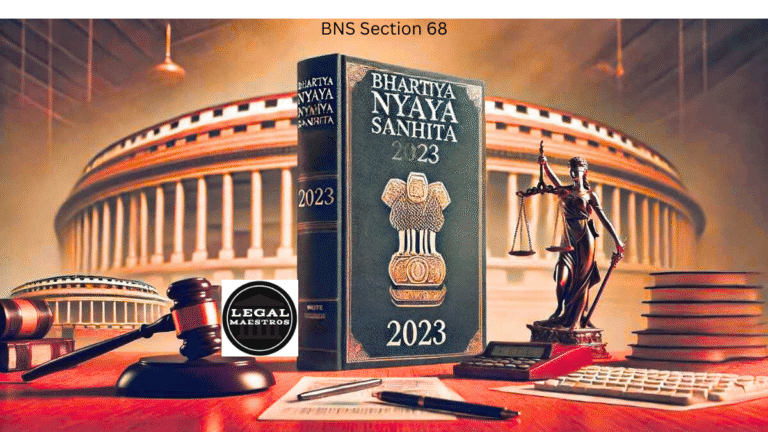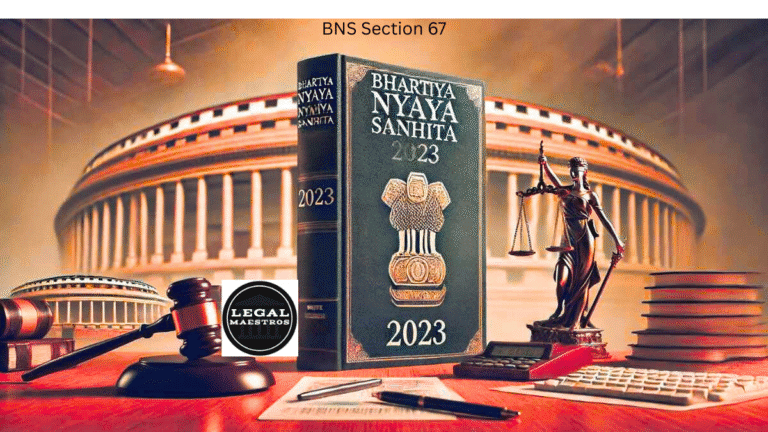
Section 50 of the Bharatiya Nyaya Sanhita, 2023: Punishment for Abetment When the Abetted Person Acts with a Different Intention
The Indian Penal Code (IPC) from 1860 has been replaced with the Bharatiya Nyaya Sanhita (BNS), which was published in 2023 and can be considered India’s revised criminal code. Section 49 of the BNS addresses the punishment for abetment in situations when the act that was abetted is done as a result of the abetment, and there is no explicit provision established within the Sanhita for the punishment of abetment.
What Exactly Is the Abetment?
Encouraging, inciting, conspiring, or providing assistance to another individual in order to commit a crime is an example of abetting. There are three basic types of abetment that are recognized by the BNS:
1. Instigation” refers to the act of provoking or inciting another person to do a criminal act.
For any queries or to publish an article or post or advertisement on our platform, do call at +91 6377460764 or email us at contact@legalmaestros.com.
2. Conspiracy” refers to the act of agreeing with one or more individuals to commit a criminal act.
• Aiding” refers to the act of providing assistance or support in order to perform a criminal act.
An act is judged to have been committed “in consequence of abetment” when it is something that directly comes from the instigation, conspiracy, or aid that was provided.
For any queries or to publish an article or post or advertisement on our platform, do call at +91 6377460764 or email us at contact@legalmaestros.com.
Punishment in the Event That There Is No Particular Provision present Section 49
According to Section 49, if a person aids and abets a crime, and the offence is committed as a result of the aid and abetment, but there is no explicit provision in the BNS for punishing such abetment, then the abettor shall be punished with the punishment that is specified for the offence to begin with.
That the person who abetting the crime is subject to the same legal repercussions as the one who really committed the crime is the result of this.
Examples to Illustrate the Point
Take into consideration the following examples in order to acquire a deeper comprehension of the application of Section 49:
For any queries or to publish an article or post or advertisement on our platform, do call at +91 6377460764 or email us at contact@legalmaestros.com.
As an illustration, let’s say that A encourages B to provide false testimony during a legal hearing. In response to A’s provocation, B commits the crime of perjury. For the sake of this scenario, A is responsible for aiding and abetting the crime, and he is subject to the same punishment as B for providing false evidence.
The second example is that A and B are plotting to poison Z. The poison is obtained by A, who then distributes it to B, who then administers it to Z, which ultimately results in Z’s death. By conspiring and facilitating the act of murder, A is also guilty of abetting murder and suffers the same sentence as B. Not only is B guilty of murder, but A is also guilty of abetting murde
In comparison with the Indian Penal Code the following:
For any queries or to publish an article or post or advertisement on our platform, do call at +91 6377460764 or email us at contact@legalmaestros.com.
The section 109 of the Indian Penal Code is equivalent to the section 49 of the BNS. In each of these sections, the instances in which an offence is committed as a result of abetment are discussed; nonetheless, there is no explicit provision that addresses the punishment of abuse. The primary distinction comes in the fact that the legal code has been updated and reorganized under the BNS in order to better conform to the requirements of modern-day law.
Section 49’s Significance in the World
According to Section 49, those who play a significant role in the commission of an infraction are held equally liable under the law, even if they do not carry out the act themselves. This is the case even if they do not carry out the act themselves. This clause preserves the notion that those who instigate, conspire, or assist in the commission of a criminal conduct cannot avoid legal responsibility simply because they did not carry out the illegal act directly.
The legal notion that abettors are just as guilty as the major criminals is reaffirmed in Section 49 of the Bharatiya Nyaya Sanhita, 2023. This principle states that abettors are held accountable for their actions when their encouragement, conspiracy, or support leads to the commission of an offense. The purpose of the law is to strengthen the general integrity of the judicial system by discouraging persons from aiding or supporting criminal actions. This is accomplished by imposing similar punishments on those who do not commit the crime themselves.
For any queries or to publish an article or post or advertisement on our platform, do call at +91 6377460764 or email us at contact@legalmaestros.com.





![Research Assistantship @ Sahibnoor Singh Sindhu, [Remote; Stipend of Rs. 7.5k; Dec 2025 & Jan 2026]: Apply by Nov 14, 2025!](https://legalmaestros.com/wp-content/uploads/2025/11/Gemini_Generated_Image_s0k4u6s0k4u6s0k4-768x707.png)
![Karanjawala & Co Hiring Freshers for Legal Counsel [Immediate Joining; Full Time Position in Delhi]: Apply Now!](https://legalmaestros.com/wp-content/uploads/2025/11/Gemini_Generated_Image_52f8mg52f8mg52f8-768x711.png)
![Part-Time Legal Associate / Legal Intern @ Juris at Work [Remote]: Apply Now!](https://legalmaestros.com/wp-content/uploads/2025/11/ChatGPT-Image-Nov-12-2025-08_08_41-PM-768x768.png)
![JOB POST: Legal Content Manager at Lawctopus [3-7 Years PQE; Salary Upto Rs. 70k; Remote]: Rolling Applications!](https://legalmaestros.com/wp-content/uploads/2025/11/ChatGPT-Image-Nov-12-2025-08_01_56-PM-768x768.png)